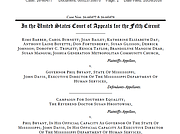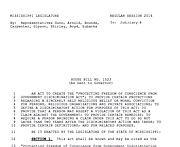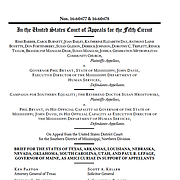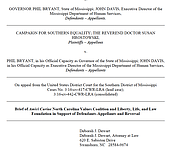Wednesday, November 30, 2016
Gov. Phil Bryant (pictured) and John Davis, the executive director of the Mississippi Department of Human Services, appealed the U.S. District Court’s ruling to strike down House Bill 1523. Photo by Imani Khayyam.
JACKSON — In the language of people who refuse to fight in wars like Vietnam, Mississippians should have "conscientious objector" status if they do not want to recognize LGBT citizens' right to get married, Gov. Phil Bryant is arguing in a federal appeal to help House Bill 1523 become law in the state. A federal judge ruled the law, which the state Legislature passed and Bryant signed, unconstitutional late on June 30, right before it was set to go into affect.
The law, in part, could trump the decisions of the city of Jackson to updated its anti-discrimination ordinance that prohibits discrimination based on sexual orientation or gender identity.
Bryant and John Davis, the executive director of the Mississippi Department of Human Services, filed a 421-page formal appeal brief on Oct. 26, prompting a group of states, the Foundation for Moral Law, the Christian Legal Society and the North Carolina Values Coalition to add their support for the "Protecting Freedom of Conscience from Government Discrimination Act," which would allow circuit clerks to recuse themselves from issuing same-sex marriage licenses (among several other provisions) if it violates their "sincerely held religious belief" that "marriage is or should be recognized as the union between one man and one woman."
Texas, Arkansas, Louisiana, Nebraska, Nevada, Oklahoma and South Carolina, Utah and the governor of Maine filed a brief in support of House Bill 1523, arguing that the U.S. Supreme Court's ruling in Obergefell v. Hodges in 2015 that same-sex marriage is a constitutional right does not prevent states from giving protection to religious adherents who disagree with the practice.
"Obergefell held that the Constitution does not allow government to prohibit same-sex marriage. But it simultaneously explained that the free-expression and free-exercise rights of religious adherents who disagree with same-sex marriage must be 'given proper protection,'" the states' brief says.
"States and the federal government have a long history of protecting individual freedom by creating opt-out rights for conscientious objectors to certain conduct. And Mississippi enacted this particular law against the backdrop of other governments punishing their citizens for declining to channel their personal expressive activity as those governments commanded."
Those "other governments" are primarily in blue states, like Washington state, that have passed laws in the other direction, outlawing discrimination against people because of their sexual orientation or gender identity, prompting lawsuits from supposedly aggrieved business owners who do not want to sell flowers to gay couples or make cakes for gay weddings.
Targeting Local Control
While Mississippi could pass such a law making it illegal to discriminate against someone based on sexual orientation or gender identity, it is far from likely, Beth Orlansky, one of the lawyers for plaintiffs in the Barber v. Bryant case that helped get the state law halted, told the Jackson Free Press.
"A state that passes 1523 is extremely unlikely to pass a law the way that Washington state has gone," Orlansky said.
In fact, HB 1523 signals exactly the opposite, taking the opposite stance of several U.S. cities' recent anti-discrimination ordinances. Cities are allowed to introduce anti-discrimination resolutions or ordinances, the difference is legal recourse for discrimination. In Mississippi, only one city has such an ordinance: Jackson. Earlier this year, the City of Jackson updated its unlawful discrimination ordinance by adding "sexual orientation" and "gender identity" to their list of protected categories.
If a specific part of House Bill 1523 becomes law, however, state law would overrule the anti-discrimination ordinance, Orlansky said.
A section of House Bill 1523 says, "This act also applies to, and in cases of conflict supersedes, any ordinance, rule, regulation, order, opinion, decision, practice or other exercise of the state government's authority that impinges upon the free exercise of religious beliefs or moral convictions protected by this act."
This is exactly what happened in Charlotte, N.C., earlier this year when its General Assembly passed House Bill 2.
Bathroom Bills and Values
In February 2016, the City of Charlotte passed an anti-discrimination ordinance prohibiting discrimination against LGBT citizens illegal there. It also allowed transgender men and women to use the bathroom of the gender each identifies with.
The new ordinance prompted a special session of the North Carolina General Assembly on March 23, which led to the new House Bill 2, a state law banning transgender men and women from using the public restrooms of the gender they identify with if they have not undergone surgery. The bill set off protests around the country, including now-infamous boycotts such as the NBA moving its All-Star game out of the state.
Tami Fitzgerald, the executive director of the North Carolina Values Coalition, said her organization is interested in the House Bill 1523 case because of North Carolina's House Bill 2. She said the 5th Circuit's ruling could affect how House Bill 2 is adjudicated in the future.
Like in Mississippi, North Carolina's attorney general refused to defend House Bill 2. Mississippi Attorney General Jim Hood has refused to defend House Bill 1523 in federal court, and Gov. Bryant is using his own lawyer as well as attorneys from the Alliance Defending Freedom to fight for the bill's life. The Alliance Defending Freedom is a national Christian-right legal organization fighting several current court battles to block LGBT and abortion rights, among other conservative causes.
Fitzgerald said the legal hearings for HB 2 are postponed until summer 2017, likely because the court is waiting to see how the U.S. Supreme Court rules in the G.G. v. Gloucester County School Board case. In that lawsuit, a Virginia transgender student challenged his school board's bathroom policy, which is similar to North Carolina's House Bill 2.
House Bill 2 is necessary to keep both men and women using public bathrooms safe, Fitzgerald said.
"The state Legislature passed House Bill 2 to repeal the Charlotte ordinance so that the privacy and safety of women and children and men in bathrooms, showers and locker rooms would be protected because the Charlotte city ordinance would have allowed men into the women's bathroom," Fitzgerald told the Jackson Free Press.
HB 2 opponents argued that the ordinance protected transgender men and women, allowing them to use the bathroom of their gender identity, and did not endanger the public. Fitzgerald argues that the free exercise of religion to block another's exercise of a legal right is not discrimination, and she hopes the 5th Circuit will rule HB 1523 constitutional because it helps protect that right.
The crux of Bryant's argument, Orlansky says, is that HB 1523 creates an accommodation for people whose religious beliefs are at odds with the Obergefell decision. Orlansky said the plaintiffs' argument is that HB 1523 goes farther than accommodation: that the bill prefers certain religious beliefs over other religious beliefs.
"Our argument is that it's not an accommodation, it's a preference and giving them certain rights (above others)," she said.
Once the plaintiffs file responses with the 5th Circuit on Dec. 16, a three-judge panel will review the briefs and could either rule or hold a hearing.
"I think particularly because all these other states have weighed in, we might have a hearing," Orlansky said. Plaintiffs in the original lawsuits have asked for an extension of time and will not file their response to Bryant's brief until Dec. 16.
When that will be is unclear, and it could be months down the road.
Email state reporter Arielle Dreher at [email protected]. For more stories about House Bill 1523, visit jacksonfreepress.com/lgbt.




